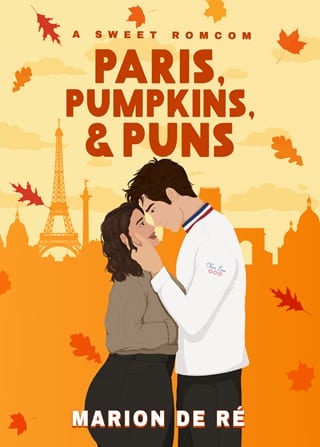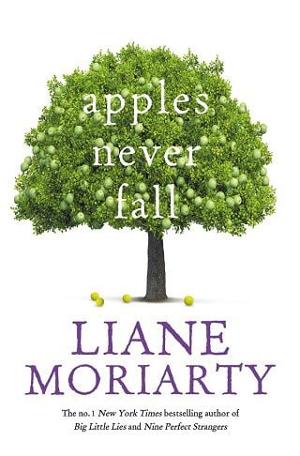2. Chapter 2
Chapter 2
Hazel
Paris is nothing like I expected. My sister, along with every American tourist guide ever, are all big fat liars . The city is dirty, the whole place smells like tobacco smoke, and I have yet to see a single man wearing a beret! Yes, I know I said I didn't care about French guys, but I figured it wouldn't hurt to look. Turns out, I was right, because there is nothing to see.
Instead of food critiques, I should be writing an article entitled Paris: Reality vs Expectations . Because, people, Hollywood got it wrong. Dead wrong.
To top it all off, there's a national strike going on—that cliché was spot on—which means demonstrations are taking place in the streets. They even vandalized the shop windows on the Champs-Elysées. Thankfully, I was able to take a stroll there earlier this week before the vandals hit. And, okay—it was pretty amazing. Walking down a wide street lined with towering trees sporting their fall colors was like staring into a movie. The reds, oranges, and yellows mingled together, giving the street a tranquil aura. It was all very poetic. Until a pigeon decided that the top of my head was a great place to defecate. Yeah, even the pigeons here are against me.
The only two things that Paris didn't get wrong are the shopping and the food. The former was tragic for my bank account, and my credit card is almost maxed out. But since I'm leaving tomorrow, it's not a big deal.
I'm glad to be heading home, but facing Jeff won't be easy. How am I going to tell him that I'm not interested? He probably believes all those falsehoods they feed us about Paris, which means he expects a positive answer from me. I love my job, and the promotion would be great for my career. But honestly, would anyone willingly live somewhere where the trash hasn't been collected for an entire week?
I mean, come on, people. I know there's a strike going on, but this is not okay.
That said, Jeff's disappointment will be nothing compared to my own. I didn't want to make the move at first, but I had high hopes for my new Parisian life. Instead, I was slapped with a reality check. My life is just as dull here in Paris as it is in the US. Turns out, the location has nothing to do with my misery. And it won't get better any time soon, because when I return to Florida, I'm going to have to look for a new place to live.
I pad out of the bathroom after my shower and glimpse the partial view of the Eiffel Tower from my window. It really does sparkle at night, and it's gorgeous. Until you decide to go see it closer, almost get run over by a scooter, and slip on a fallen leaf because the ground is still slick from all the rain. Ask me how I know.
Tonight is my last night in Paris, which also means my last dinner. I get dressed in a new outfit I picked up in La Samaritaine yesterday. Well, "picked up" might not be the right words. I had to fight for it, scouring for hours until I finally found my size, but it was totally worth it. Black flared pants are paired with a white lace top and a beige blazer. Very Parisian chic. Even if they don't wear berets, French women still have a great sense of style. I match the outfit with my beloved black stilettos, and I'm good to go. The place I'm visiting tonight is Cezanne, the Michelin-starred restaurant located right here in the hotel. Perfect, since it's been raining all day.
I saunter into the restaurant parlor, which is elegantly decorated in red velvet with gold trimmings.
"Bonsoir ," a tall brunette says with a bright smile.
" Bonsoir. Jay houn reservation pour houn person, sil vou play ."
At least I've made some progress with my French since I got here. I wasn't too bad in high school and college, so I had a small base to build on. And honestly, I'm glad I had the chance to practice here. It's kind of like riding a bike. Once you learn a little French, it doesn't really go away.
She wears a puzzled frown at first, then nods. She replies in English. "Oh, yes. What's your name?"
I guess I still have to work on that accent.
"Clark. "
She peers at her tablet and taps on the screen. "Right this way, Ms. Clark."
I follow her across the dining room, which is beautifully decorated in the same red and gold pairing. The walls look soft and comfy thanks to the velvet, and the entire space sparkles with gold accents from the chandelier and furniture to the paintings adorning the walls. The muraled ceiling is spectacular, showcasing a choir of angels flying in the clouds. Even if it is a tad old-fashioned, this is the most luxurious-looking restaurant I've visited this week. They're really rocking the Rococo style. A picture of this dining room should be pasted next to the word in the dictionary. Couldn't be any more accurate.
Most of the round tables are empty, but that's not unusual for seven o' clock. I'm always the first to arrive. The French tend to eat around eight p.m.
"Here's your table," the waitress announces, drawing out the chair for me. Once I'm seated, she hands me a menu and leaves me to explore my options.
As with most high gastronomy restaurants in Paris, the only offering is a tasting menu. Seven courses tonight, and they all look promising. Two appetizers, a fish course, a meat course, cheese, and two desserts .
After a few minutes, a tall man in glasses comes to my table with a bottle of water.
"Good ‘ivening, madame," he says, pouring me a glass. "Can I offer you an apéritif ? A glass of champagne, maybe?"
"Sure," I reply with a polite smile.
"'Ave you looked at ze menu? Do you ‘ave any questions or allergies?"
"No. I eat everything," I say with a cheeky grin, but he doesn't seem to find my quip very amusing.
He promptly takes my menu. "I will be right back wiz your champagne."
I'm not sure what to expect. I try to avoid doing much research before eating somewhere for the first time. That allows me to be completely unbiased while I sample the food and write my critique later. The suspense also makes me extra excited to dig in. All I know is that this is a Michelin three-star restaurant that recently changed chefs. Philippe Brun, a gastronomy legend in France, has stepped down to pass the reins to his promising son.
The first dish lands on my table quickly, and it's a timid start. The mushroom velouté is dull, desperately missing something to stimulate my taste buds. Next comes the pan-fried foie gras with caramelized butternut squash and pears. It's actually not bad—I've never had warm foie gras before, and I think I prefer it to the cold version—but it's not mind-blowing either. The warm toasted gingerbread they served with it was a nice touch, though. The fish is cooked to perfection, but again, it's nothing to write home about. And when the main dish arrives, I'm not even excited anymore.
I take my first bite, and it's good. Everything is tasty and well-executed, but the dish lacks something. There is no creativity, no "wow" factor. It's a miss for me.
"Would you like some cheese, madame?" my waiter asks, pushing a cart in front of him. Here it is, my favorite moment of every meal I've eaten in Paris. Because if there's one thing every Parisian restaurant does well, it's the cheese trolley.
"Yes, of course," I say, wiping my lips with my napkin.
He settles the trolley in front of my table and opens the lid. Then, he proceeds to tell me the names of all the cheeses, but I barely understand, so I pick the tastiest looking varieties I haven't tried yet .
He lays them all on a rectangular slate, sorting them by eating direction before adding various chutneys and candied fruits around them.
" Bon appétit. "
" Merci ."
I devour my cheese, glad to find that it doesn't disappoint like the rest of the menu did. Like Paris did. At least there's always cheese to save the day.
Olivier
I wipe my forehead with the back of my arm as I lean against the stainless-steel counter. Another service finished. Another night working like a robot executing orders. Another night feeling like a failure.
" ?a va , chef?" my pastry chef asks, throwing a towel over his shoulder.
" Oui. Je vais aller en salle ," I say, bracing myself. The moment when I tour the room at the end of the night used to be one of my favorite beats of the service. Talking to diners, asking if they enjoyed their night. I always loved it. Not because of the compliments I'd receive, but because it's gratifying to hear that our guests had a good time. That the food we served made them happy for a night. I'm always humbled to talk to my guests. With so many Michelin-starred restaurants in Paris, it's an honor that they choose to dine with us. That's why my team and I always give one hundred percent to make their night special.
But that was before. Now that I work here, the meals I serve aren't really mine. And no matter how much I plead to change that, Jean-Pierre, my boss, doesn't want to hear it. That's the problem with working in palaces—a five star hotel who received the prestigious label—the hotel owns the restaurant. You're just executing the menu. Well, usually the head chef has control over that too, but I haven't earned that right yet. As my boss says, "Classic and safe. No need to change anything or take risks. Just follow your father's recipes."
What he doesn't understand is that when you're a chef, you always need to challenge yourself. You have to constantly evolve, otherwise you die slowly. While that's true for anyone who has a creative brain, it's especially true for a chef. And my motives aren't purely selfish. If we stay stuck in our ways and keep serving our clients the exact same thing, they'll look for greener—and tastier—pastures.
Alas, explaining that to Jean-Pierre, who comes to work wearing the same tie every day, is a lost cause. I've tried countless times these past few months, but he always shuts me down. After all, he hired me for my family name, not for my talent or ideas.
Taking a deep breath, I push through the swinging doors to the dining room. The restaurant is packed, but I'm not sure how long that will last. We've gotten some nasty reviews lately, a lot of them from first-timers or occasional guests who wanted to try my cuisine but were disappointed because of how similar it was to my dad's. An issue Jean-Pierre brushed off as soon as I brought it up to him. "Don't worry, Olivier," he said. "Your dad's cuisine is legendary, so this is by no means a bad thing. Plus, we have a lot of returning customers here who have certain expectations."
Straightening my posture, I begin my tour of the room, asking clients how their meal was. Some say they enjoyed it, and some have a few critiques to make, but most bear the same expression. The one that says, "It was good, but nothing spectacular." And I hate that look. I cook to convey emotions, positive ones of course. I want to make people feel something when they eat my food. I wish for them to remember their dinner, remember the taste in their mouths. But once again, I failed miserably.
I'm approaching the last table in the room, and my breath catches in my lungs. Sitting at the table is a beautiful woman. Shoulder-length dark-brown hair, slightly wavy and glossy. But it's her eyes that sparkle the most. Even brighter than the hideous golden fixtures that litter the room. As I draw closer, I try to settle on a color, but I can't decide between brown and green. What surprises me most is that she's eating alone.
"Bonsoir ," I say, a genuine smile on my face. " J'espère que vous avez passé une bonne soirée."
" Bonsoir ," she says with a cute American accent. " Merci. C'était bonne, oui. Mais quelques things étaient . . . disappointing ."
"Oh, I'm sorry the meal didn't meet your expectations," I say, her words all too familiar. "Was there something in particular?"
"Yes," she says, clearly relieved to be speaking English. "I found the first course to be kind of dull. There was no spark or flavor, really. A bit boring, if I can be blunt. "
"Please," I say, forcing a tight smile. Usually, I wouldn't worry about criticisms from an American—they don't have the same palate as us—but if even the foreigners aren't enjoying my cuisine, we're barreling straight into the wall.
"The rest was good, but I was expecting a twist on the traditional recipes. It all lacked creativity and passion, in my opinion."
There used to be twists , I say inwardly. Until Jean-Pierre tasted my dishes and told me to go back to the original recipes. "I understand," I say, my tone polite. She seems to know what she's talking about. "Is there anything you liked?"
Her brownish green eyes warm. "I liked the foie gras and the cheese."
Great. Two things I didn't even make.
"Are you here on vacation or for work?" I ask, unable to tear my gaze away from her. I should run, honestly. This situation isn't pleasant by any means. But for some reason, my feet stay firmly planted on the ground. Maybe I'm becoming a masochist. It wouldn't be a surprise, given my disastrous love life and how long I willingly stayed with women who were taking advantage of me .
"Work," she says, smiling for the first time. And damn, that smile is beautiful. The entire room—and my mood—lights up instantly. "It's my last day. Going back to Florida tomorrow." She scratches the back of her neck, averting her eyes. "I came to Paris for a historical tour—I'm an historian—well a researcher for a university."
"And a foodie, obviously."
She nods, her smile widening. "Oh, absolutely. That's why I was thrilled the university sent me here. I got to try so many amazing restaurants."
And mine wasn't one of them , I silently add, looking away. "Well, thank you for dining with us. Enjoy the rest of your trip, and have a safe flight back to Florida," I say as pleasantly as possible.
She blushes slightly. "Merci ."
As I spin on my heel and march back to the kitchen, I breathe a sigh. Being a chef has never really helped me in the love department, but for one brief second, I imagine how different this conversation could have gone if I'd served her a meal that swept her off her feet. Maybe, I would have been bold enough to ask her out. Maybe, she'd have said yes, and we could have enjoyed a fantastic night in Paris together. But the truth is, I'm a failure, so there will be no late-night romantic escapade for me.
 Fullepub
Fullepub 



